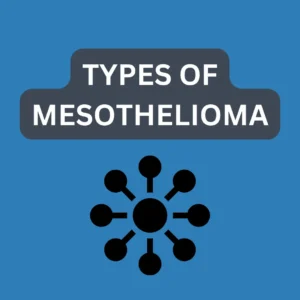Mesothelioma is a very rare form of cancer, caused by exposure to asbestos. There are four different types of mesothelioma, all beginning in different parts of the body. These four types are called pleural mesothelioma, peritoneal mesothelioma, pericardial mesothelioma and mesothelioma of the tunica vaginalis.
Pleural mesothelioma
The most common of the four types, this form of the disease affects approximately 75% of all patients and it begins in the thoracic cavity. This type of mesothelioma develops in the lining of the lungs. After inhaling asbestos, the fibers can get stuck in the pleura, causing irritation. The pleura is a thin layer of tissue that lines the interior wall of the chest cavity and covers the lungs. Once on the lungs, the fibers make their way to the pleural lining leading to DNA mutations and scar tissue which can cause the cancer mesothelioma. Pleural mesothelioma takes about 10 to 70 years to develop and those who are diagnosed are usually veterans and blue-collar workers. Some symptoms of pleural mesothelioma include but are not limited to shortness of breath, cough, trouble swallowing, hoarseness, pain in the side of the chest or lower back, weight loss and night sweats.

Peritoneal mesothelioma
This type of mesothelioma affects about 20% of all patients and it begins in the abdominal cavity. Men and women are both just as likely to be diagnosed with this type of mesothelioma. Common symptoms include swelling or fluid in the abdomen, nausea and vomiting, constipation, chest pain, pain in the abdomen, loss of appetite, nights sweats, fever and difficulty breathing. For this type of mesothelioma, most patients undergo chemotherapy. Another highly effective treatment option is one that combines surgery with hyperthermic intraperitoneal chemotherapy, which is a cancer treatment in which the abdominal cavity is filled with chemotherapy drugs that have been heated. Palliative care is really common among patients diagnosed with peritoneal mesothelioma because it can control symptoms.
Pericardial mesothelioma
Extremely rare, pericardial mesothelioma begins in the lining of the heart and affects less than 1% of patients. This type of mesothelioma affects men more than women and is usually realized between ages 50 and 70. The most common treatments are chemotherapy and surgery. Since symptoms of this cancer mimic those of other heart conditions, it can be difficult to diagnose. Symptoms may include irregular heart rhythm, heart murmur, shortness of breath, pain in the chest, night sweats, fatigue and fever.
Testicular mesothelioma
Mesothelioma of the tunica vaginalis is the rarest form of mesothelioma and begins in the cell layer covering the testicles. Symptoms include hydrocele, which is abnormal fluid retention around the testicle, enlargement of the scrotum, inguinal mass, solid scrotal mass and spermatocele. Upon diagnosis, the most common treatment option is surgery.
If you or a loved one has been diagnosed with any of these types of mesothelioma, contact the Halpern Law Firm today. With over $100 million won in settlements and verdicts we are here to help. Contact us at 800-505-6000 today for a free case evaluation.
Sources:
https://www.cancer.gov/publications/dictionaries/cancer-terms/def/pleura
https://www.asbestos.com/mesothelioma/pleural/
https://www.mesothelioma.com/mesothelioma/types/testicular/
Don’t Wait—Contact an Experienced Pennsylvania Mesothelioma Attorney Today!
Now that you know the mesothelioma statute of limitations in Pennsylvania, contact an experienced attorney from our firm to represent your case before time runs out.
At Halpern Law Firm, we help clients throughout Pennsylvania, with offices in Philadelphia, Pittsburgh, Allentown, Scranton and Johnstown. Call us today for a free consultation at (800) 505-6000.
